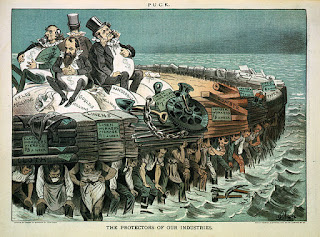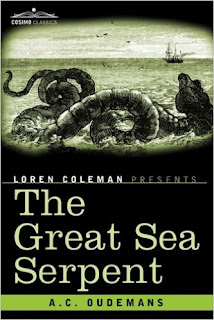Afgelopen week publiceerde het AD een artikel, "Oudemans en de zeeslang" door Theo Paijmans dat het verhaal vertelt van Antonie Cornelis Oudemans, voormalig directeur van de Haagse Dierentuin in de vorige eeuw en zijn fascinatie met zeemonsters. In 1892 verschijnt zijn boek The Great Sea-Serpent. An Historical and Critical Treatise.
Zoals het AD artikel vermeldt:
".......Het boek van Oudemans telt meer dan 500 pagina's en wordt in Nederland en Engeland uitgegeven. In Leiden waagt de respectabele uitgeverij Brill zich er aan. Zelfs de Engelse krant The Times spreekt kort over het boek. Dat er veel studie in gestoken is, ontgaat ook de doorgaans zeer sceptische Engelse redacteuren niet, maar geloven in het bestaan van zeeslangen, dat gaat te ver. 'Een logische en biologische curiositeit', schrijft The Times en daar blijft het bij.
De wetenschappelijke wereld neemt ook schoorvoetend kennis van het boek. Oudemans geniet aanzien, maar de ontvangst van zijn boek dat hij de titel The Great Sea Serpent heeft meegegeven, is allerminst hartelijk."
Het artikel vervolgt:
"....In een tijd ver voor Google en internet lukt het Oudemans om bijna tweehonderd ooggetuigenverslagen te verzamelen. Ook leest hij alles wat hij over het onderwerp kan vinden. Na drie jaar is het zover. Zijn boek is af en zijn conclusie is dat in de zeemonsterverhalen van zeelui meer schuilt dan kroeggesprekken van dorstige matrozen en het bijgeloof van 'landlubbers'. Er moet toch iets bestaan wat aanleiding geeft tot die verhalen, zo redeneert Oudemans...........Wetenschappers vinden het maar niks dat hij geloof hecht aan in hun ogen wilde verhalen. Oudemans houdt voet bij stuk. ,,Het was zijn eerlijke overtuiging dat het dier kon bestaan en dat de simpele bewering der zoölogen, dat het dier nog nooit was gevangen, geen afdoend bewijs voor het tegendeel vormde," vertelt een collega later.
Nadat Oudemans zijn carriere in Sneek als biologieleraar voortzet, sterft hij in 1943 en nu bijna 125 jaar na het verschijnen van zijn boek, is zijn boek The Great Sea Serpent nog steeds een standaardwerk en populair over de hele wereld (NB: dit boek is inmiddels in herdruk uitgegeven door Cosimo Classics, waarvan ondergetekende uitgever is, met een voorwoord van de bekende Amerikaanse cryptozoöloog, Loren Coleman).
Tuesday, May 24, 2016
Thursday, May 12, 2016
Scathing Attack on US Elites in Salon Magazine
 |
| The protectors of our industries: Jay Gould, Cornelius Vanderbilt (1883)/Commons Wikimedia |
It's an interesting development when two members of the cultural elite, albeit one more conservative and the other more progressive both decry the advent of Trump, but have divergent views on the political reality on the ground: one - Shivani - moving towards the people and the other - Andrew Sullivan, conservative Anglo-US blogger - towards the elites. This may be a sign of the times relevant to the upcoming Brexit referendum next month, the US presidential conventions during the summer and the French, German and Dutch elections next year.
Anis Shivani starts his article with a personal attack on Andrew Sullivan, who had just proclaimed in an article in New York Magazine - Democracies end when they are too democratic - that the election of Trump would be an “extinction-level” event.
Shivani says:
"........But the extinction Sullivan is most worried about is clearly that of his own breed of callous elites, who could care less about normal human beings who do not have decent jobs and who live in crappy housing and who are so desperate to find a way out of the trap that even someone like Trump starts sounding rational to them.....
.....No, the danger is the elites, who have made such a joke of the democratic process, who have so perverted and rotted it from within, that the entire edifice is crumbling (to the consternation of the elites). Both parties are in terminal decline after forty years of ignoring the travails of the average worker (the Republicans admit they’re in the intensive care unit, while the Democrats calling for Sanders to quit already have yet to come around to admitting that they might have the flu), and voters on both right and left have at last—and this is a breath of relief—stopped caring about the cultural distractions that have kept the elites in power. No, they want their jobs back, even if it means building a wall, keeping Muslims out, deporting the illegals, and starting trade wars with China and Japan—because what else did the elites give them, they’re still opposing a living wage!"
Then Shivani continues his criticism on Sullivan's statement that it’s all because of too much democracy:
Tuesday, May 10, 2016
Het geheim van de Trump communicatie
 |
| Donald Trump /M.Vadon Creative Commons |
Nu las ik een interessant artikel op de site Frankwatching, "Psychologische trucs & hypnose: hoe Donald Trump de verkiezingen wint" van Vincent van der Burg. een deskundinge op het gebied van Neuro Linguistisch Programmeren. Na analyse van de interviews en speeches van Trump, komt van der Burg met zijn verklaring waarom kiezers op Trump stemmen, namelijk doordat ze overtuigd worden door Trump's handige gebruik van psychologische trucs. van der Burg zegt o.m.:
".....Donald Trump gebruikt in zijn communicatie doelbewust en consistent manipulatieve taalpatronen die erop gericht zijn om grote groepen kijkers en luisteraars onbewust te beïnvloeden. Niet volgens de wetten van gezond verstand, logica en ratio, maar door het aanspreken van het onderbuikgevoel en evolutionaire angsten en driften.........."
Trump maakt daarbij gebruik van 6 lessen van de grondlegger van hypnose, Milton Erickson, m.n.
Thursday, May 5, 2016
Cinco de Mayo......Mexican or American Holiday?
 |
| Batalla de Puebla, 5 de mayo de 1862 source: Wikimedia Commons. |
What is the real story here? Wikipedia states that
" the Battle of Puebla took place on 5 May 1862, near the city of Puebla during the French intervention in Mexico. The battle ended in a victory for the Mexican Army over the occupying French forces. The Mexican victory is celebrated yearly on the fifth of May. Its celebration is regional in Mexico, primarily in the state of Puebla,where the holiday is celebrated as El Día de la Batalla de Puebla .......................this holiday remains very popular in the United States where it is celebrated yearly as Cinco de Mayo."
In the U.S., Cinco de Mayo is often mistaken to be Mexico's Independence Day, which took place on September 16, 1810, and is considered the beginning of the Mexican War of Independence, a revolt against the Spanish colonial government started by the by Miguel Hidalgo, a Mexican Catholic priest.
Next time you see a Cinco de Mayo party in American cafes or restaurants, don't expect to find too many Mexicans, unless they are from Puebla, but mostly Americans looking for a good time with margaritas and tacos.
Subscribe to:
Posts (Atom)
